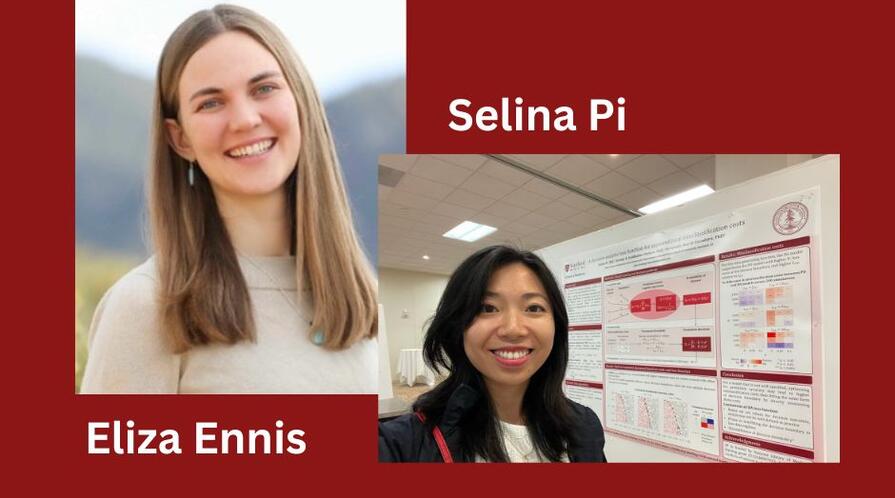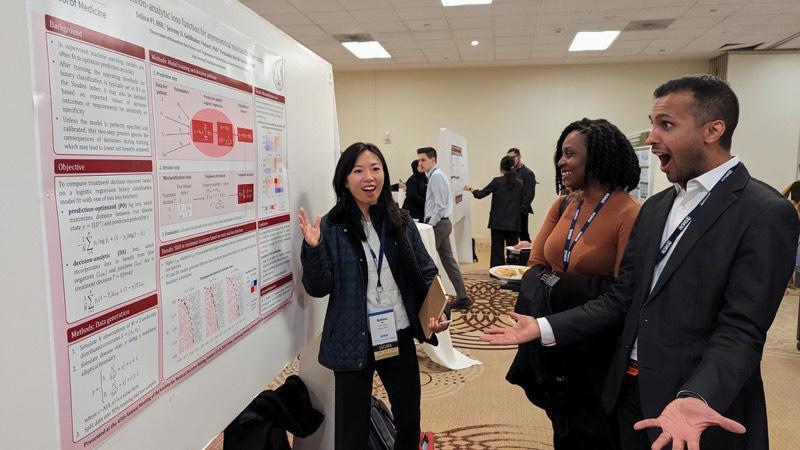NSF Graduate Research Fellowship Winners—Health Policy Innovators
NSF Graduate Research Fellowship Winners—Health Policy Innovators
Eliza Ennis and Selina Pi—two PhD students who are working with Stanford Health Policy faculty mentors—have been awarded National Science Foundation graduate fellowships.

Stanford Health Policy PhD student Eliza Ennis has been awarded a National Science Foundation Graduate Research Fellowship to continue her modeling work on the syndemic of HCV, HIV, and overdose in San Francisco County.
Ennis, a Knight-Hennessy Scholar who is on the decision-sciences PhD track, is working on a discrete-time microsimulation model focused on disease transmission and drug-related health events among the high-risk population of people who inject drugs (PWID) as well as sexual disease transmission among non-PWIDs in the county. Her agent-based model captures heterogenous risk for overdose, equipment-sharing and sexual disease transmission—and mortality across the population of San Francisco.
“I plan to use this model to evaluate the cost-effectiveness of harm reduction policies including the establishment of supervised injection facilities. Down the line, I also hope to expand this model to different geographies to increase the generalizability of any findings,” Ennis said. “As overdose deaths continue to rise nationwide, I hope this work can inform county, state, and national harm reduction policies and ultimately drive down mortality.”
Ennis has been mentored by SHP professors Jeremy Goldhaber-Fiebert, Josh Salomon, Margaret Brandeau and Doug Owens.
“I am so grateful for the mentorship and support I’ve received on this project from Jeremy, Josh, Margaret, and Doug. I have been especially lucky to be part of Josh’s Prevention Policy Modeling Lab, which has enabled me to work with a consortium of scholars modeling HCV, HIV, and PWID populations, including Marissa Reitsma and Lin Zhu,” Ennis said. “I’m excited to keep building my skills as a researcher while learning from the rest of the team.”
Reitsma is a fellow PhD student and Zhu is a Stanford Health Policy research engineer.
Importance of Mentorship
Stanford Health Policy faculty mentor students within the SHP education programs as well as students across campus.
“Given the mission of the Department of Health Policy, one of the most important roles faculty can play is that of mentor to our trainees,” said Goldhaber-Fiebert. “The energy, dedication, and potential that our trainees possess make being a mentor a true pleasure. This is especially the case when I have the chance to co-teach and co-mentor with stellar colleagues like Fernando.”
Fernando Alarid-Escudero, an assistant professor of health policy, is working with Selina Pi, a PhD student in the Department of Biomedical Data Science who also was just awarded an NSF graduate research fellowship to explore how likelihood ratios can be used to account for the effect of covariate drift on machine learning model predictions.
In hospital, epidemic, or other settings where existing models are applied to new populations, predictions may be needed to inform decisions in real time before validating how well the model generalizes. Since changes in the deployment population can degrade model performance—which in turn negatively impacts care decisions—she hopes this research will lead to new methods to accurately adjust models to different populations without the time-consuming and expensive process of retraining a separate model.
“The question stemmed from work I was doing with my advisors Fernando and Jonathan Chen on translating model predictions to decision-making,” Pi said. “Fernando is truly an encyclopedia of knowledge and is always ready to teach concepts on the whiteboard or point me to useful papers whenever I have a question.”

Goldhaber-Fiebert—who co-teaches a class on decision science methods and modeling with Alarid-Escudero—was Pi’s mentor on the project that led to her first conference presentation. She is now working with them to build a microsimulation model to evaluate colorectal cancer screening, testing how modeling assumptions for the natural history of cancer affect the predicted benefits and costs of various screening strategies.
“These mentors have provided invaluable guidance on structuring projects, brainstorming experiments, writing better code, and communicating my results more effectively,” Pi said. “I'm so grateful to have the opportunity to grow as a scientist while working with them and other brilliant researchers in health policy and biomedical data science.”



